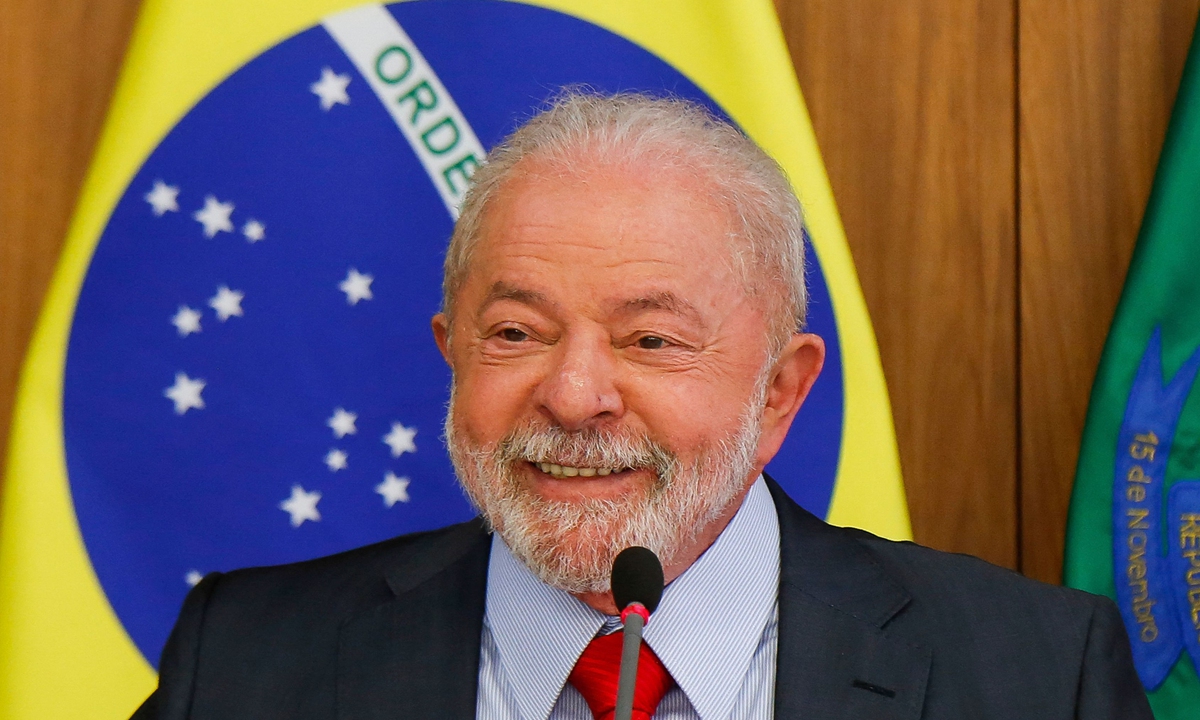
Brazilian President Luiz Inácio Lula da Silva Photo: VCG
Amid a busy spring diplomatic schedule, China will welcome another old friend - Brazilian President Luiz Inácio Lula da Silva, who will pay a state visit to China from Wednesday to Saturday.
Lula's visit carries the great expectation that China and Brazil, both developing countries and emerging economies, will usher in a new era for bilateral relations and inject positive impetus into the world, observers said.
Chinese Foreign Ministry spokesperson Wang Wenbin said on Tuesday's routine press briefing the fact that President Lula da Silva will lead a large delegation to China on his state visit so soon after his recovery speaks to the high importance both sides attach to this visit and our bilateral relations.
China stands ready to work together with the Brazilian side and take this visit as an opportunity to upgrade our mutually beneficial friendly cooperation in various sectors and bring more positive energy to developing countries' solidarity, cooperation and joint response to global challenges, the spokesperson said.
Lula was scheduled to arrive in Shanghai on Tuesday and then go to Beijing to meet with Chinese leaders. The four-day visit was rescheduled after the previous plan was postponed as Lula was diagnosed with flu and pneumonia, according to the Brazilian government.
This is Lula's fifth visit to China and his first trip outside the Western hemisphere during his third term in office starting January 2023.
Lula, as a left-wing leader, has attached great importance to China-Brazil relations as during his previous term, cooperation on trade and economy as well as people-to-people exchanges witnessed fruitful outcomes, analysts said, expressing high expectation for upgrading relations during Lula's visit.
The Brazilian delegation to China, in terms of its size and composition, is different from the one going with Lula to the US in February. Besides ministers, officials and businesspeople, many congressmen of the opposition have also joined in the visit, highlighting that boosting friendliness with China has become an inter-party consensus, Wang Youming, director of the Institute of Developing Countries at the China Institute of International Studies in Beijing, told the Global Times on Tuesday.
Lula visited the US and met with US President Joe Biden in February where the Brazilian delegation was disappointed at the US' insufficient help to combat Amazon deforestation and its lack of enthusiasm for Lula's offer to help broker peace between Russia and Ukraine, according to a Guardian report in March.
Closer tiesThe original delegation that was to accompany Lula included 240 representatives from ministers in different sectors, state governors, senators and congressmen. After the president postponed the visit, some companies traveled to China in advance.
It is expected Lula's visit will push the bilateral relations to a new level, with great possibility for the two sides to sign a slew of cooperation documents on trade and investment, finance, infrastructure and also on the China-proposed Belt and Road Initiative, Sun Yanfeng, a research fellow at the Institute of Latin American Studies of the China Institutes of Contemporary International Relations, told the Global Times on Tuesday.
Around 20 bilateral agreements are anticipated to be signed during Lula's visit. One of them is for the construction of CBERS-6, the sixth in a line of satellites that have been built by Brazil and China together,according to the Brazilian government.
Agricultural cooperation is expected to be another focus during Lula's trip. Brazil has rich farm products including soybeans and beef, which are in great demand in the Chinese market, Zhou Zhiwei, an expert on Latin American studies at the Chinese Academy of Social Sciences, told the Global Times on Tuesday.
China's advanced technology in 6G and semiconductor will also help Brazil achieve a new round of industrialization and bring new impetus to bilateral cooperation, said Zhou, who also saw
cooperation under the BRI as a highlight.
Zhou noted that yuan clearing deal between China and Brazil will also be a focus during the visit. Such a move will further promote bilateral economic ties by reducing trading costs and enhancing resilience to international financial market turbulence, as monetary policies in some developed countries is now increasingly politicized.
As members of the BRICS, China and Brazil, through developing economic ties, will promote the integration within the BRICS and also drive the global economic recovery, analysts said.
Unity of developing countries The two countries have prospects of cooperation on international affairs, especially on defending and promoting multilateralism, as both hope to speed up the reforms on international institutions to make them better fit the current global situations and the interests of developing countries, said analysts.
The Ukraine crisis is likely to be on Lula's agenda. The Financial Times reported on March 24 that Lula will propose a "peace club" with China to mediate an end to the conflict when he visits China.
Lula has expressed hope to broker the Russia-Ukraine conflict, and his view to de-escalate the conflict instead of fanning flames is akin to China's stance, Wang Youming said. The international community is interested in what kind of approach the two major developing countries in the East and West hemispheres may come up with to facilitate global governance and mediate geopolitical conflicts, Wang said.
However, such unity of developing countries is not what the US wants to see, analysts said as they warned the necessity to keep vigilant to US' attempt to sow discords.
China and Brazil, as true defenders of multilateralism, hope to solve disputes and conflicts via peaceful negotiations, and their cooperation will inject positivity to global stability, said Sun Yanfeng of China Institutes of Contemporary International Relations.




